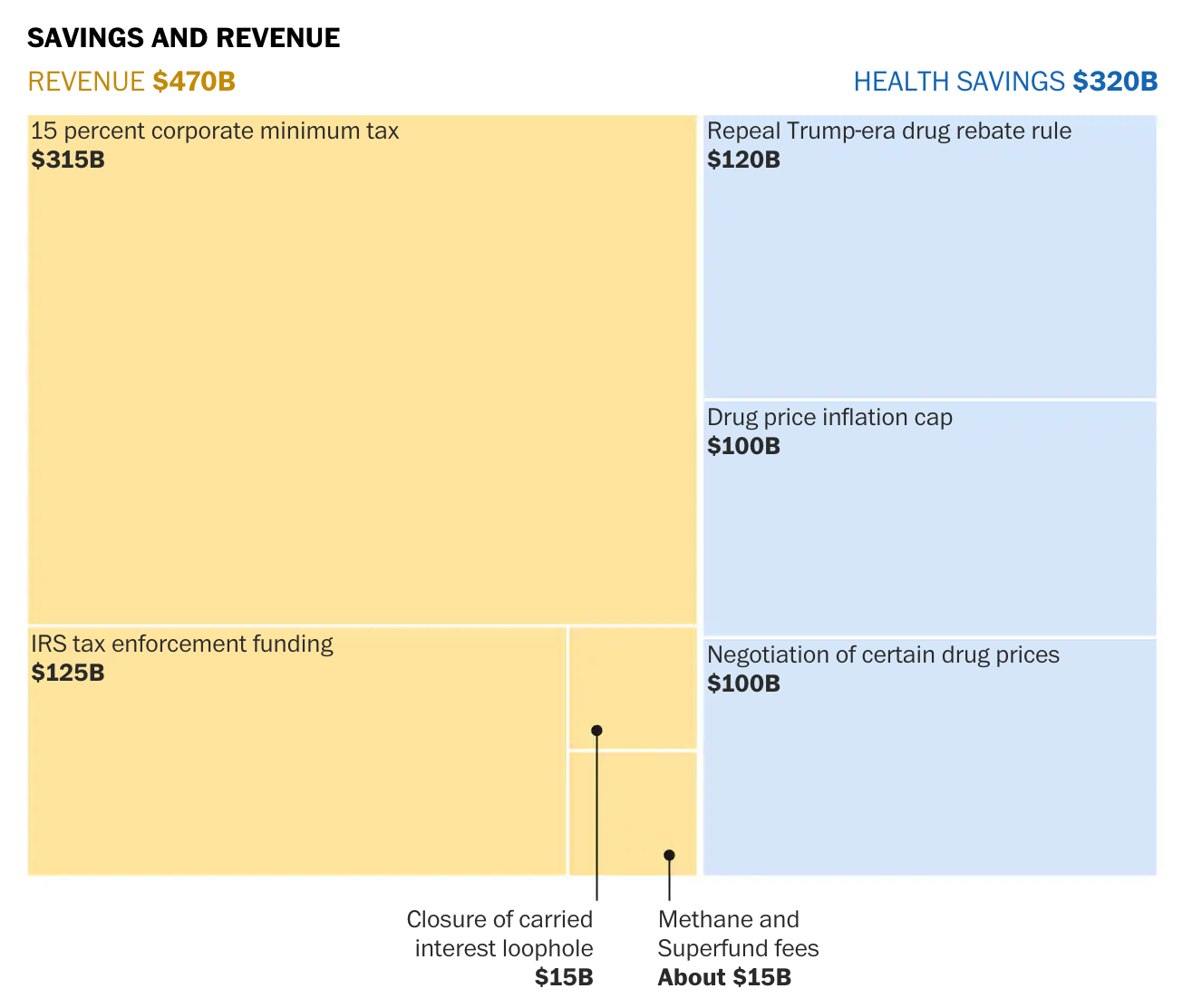The Inflation Reduction act brings hope
Joe Manchin redeems himself
As climate activists and senate staffers sobbed after Build Back Better, Biden’s investment and climate change plan, died at the hands of Joe Manchin, Manchin was quietly writing a smaller, but nonetheless significant piece of legislation that gives me great hope for the world’s fight against climate change. I’ll give my commentary on the bill and my thoughts on its components.
The bill is called the Inflation Reduction Act, and is focused on deficit-reduction, climate, and healthcare. Here is a great chart from the Washington Post that shows what is being spent (per the Committee for a Responsible Federal Budget).
Clearly, most of the money spent is on climate. I am in support of this spending. My theory of how to mitigate the worst effects of climate change are to use government incentives to lower the cost of renewable technology, leading to cheap, clean power that the developing countries of the world can install without limiting their economic growth. We’ll still get warming that’ll harm ecosystems and cause damage, but we live in a world of tradeoffs and I see little point in proposals like the Green New Deal that completely revamp the economy in a matter of just a few years. I would like a carbon tax to be the primary incentive to switch away from fossil fuels, though politically that is impossible (just look at how mad people are about gas prices), so subsidies and tax breaks are methods that I see as the next best thing.
(As a side note, I find it odd that many people miss the point that you can tax carbon making green technologies relatively cheap, lowering emissions and power bills. In a comparative government class, I remember many students believed the way government “solves” climate change is by bludgeoning fossil fuel companies into collapse with targeted regulation and taxes, which is a terrible idea.)
Notably, there is a $7,500 tax credit for new electric car purchases for couples making less than $300,000 and individuals making less than $150,000. Ultimately, using subsidies like these to increase electric car uptake can help solve the chicken and egg problem of electric cars and charging stations—no one buys electric cars because there are limited charging stations, and no one builds charging stations because few people are buying electric cars. Subsidies to increase EV purchases can kickstart this process.
There is $1.5 billion allocated for reducing methane emissions, which is pretty low-hanging fruit given that un-combusted methane is a mind-boggling 67 times more potent as a greenhouse gas than CO2. An additional $27 billion allocated for a green bank, where government funds green projects, is interesting. Ideally, these funds will be spent mainly on moonshot and experimental technologies that are less mainstream—think fusion power or hydrogen storage, though I doubt that will be the case.
Controversially, the bill also has provisions that expedite permitting for fossil fuel production, though I find the production bans and restrictions to be of limited logic in general so this doesn’t bother me.
On the revenue side, there are some big contributors. More funding for the IRS will will increase tax receipts, and a 15 percent corporate minimum tax makes a lot of sense. Many companies have been able to use various loopholes and R&D deductions to pay little to no taxes for many years. For example, Amazon’s effective tax rate was 6% last year, which Harvard Economist Larry Summers has been a big critic of, and I’m glad they’re making this change.
Both of these tax changes will be disinflationary over the short and medium term, which is a very good thing. The US needs to decrease aggregate demand in the short run to curtail price inflation, even if it means making the recession we’re in worse. The health savings provisions involve price caps for certain drugs, which, given some of the market failures in parts of the pharmaceutical market, are a good thing. The negotiation of drug prices is a great change.
Overall, the bill is a solid step in the right direction, with decent spending and good savings on the revenue side that will reduce the deficit and ultimately inflation. Additionally, the investments in clean energy will weaken inflation in the medium term (4-7 years). While the exact methods for fixing America’s problems aren’t optimal or ideal, they do address some core challenges America faces, making this bill good for it’s time.
In politics, a fine bill for a big problem can be a great outcome.




I feel like Manchin is doing one of the most impressive political balancing acts in history